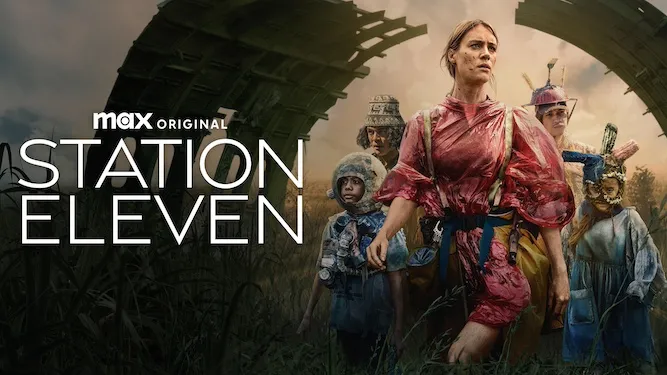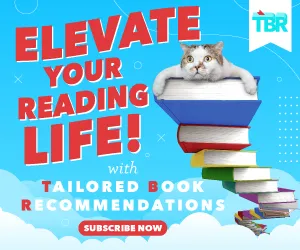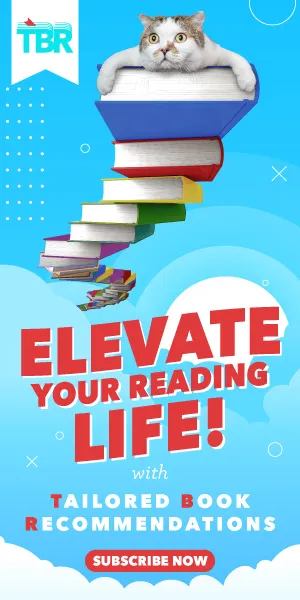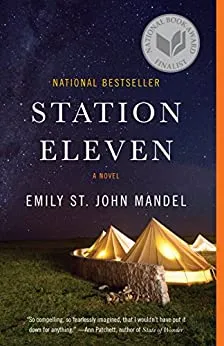
Station Eleven Helped Me Believe In an After
I almost missed out on one of the best pieces of art I’ve ever experienced, and it’s because I failed to imagine what a TV adaptation of a book could be.
On December 16, 2021, HBO Max released the first three episodes of Station Eleven, Patrick Somerville’s adaptation of Emily St. John Mandel’s 2014 novel by the same name. I don’t know what I was doing that night, but it wasn’t sitting down to watch three hours of television about people who survive a deadly global pandemic. I had read Mandel’s novel around the time of its original publication, and while I remembered enjoying it, that’s about all I remembered.
I also remembered that when HBO announced in 2019 that an adaptation was in the works with Mackenzie Davis cast in a lead role, I perked because she’s fantastic in everything she does (Halt and Catch Fire remains criminally under-celebrated), but I think I knew way down in my heart of hearts that the chances I’d actually watch it were 50-50 at best. When I thought back on reading Station Eleven, it was so firmly in the realm of not terribly memorable that I wasn’t sure how much to care about the adaptation. I didn’t have a deep enough attachment to the book to feel invested in how faithfully the show represented particular characters or events — to be honest, very few books live in that zone for me, but let’s talk when Taika Waititi’s adaptation of Klara and the Sun comes out — and I wasn’t interested enough in the story to undertake a re-read in preparation for its release.
Then 2020 happened, and while I know many folks processed the arrival of Covid through stories about other disastrous viral contagions, I spent the early months of the pandemic reading E.B. White’s old New Yorker columns about living on a farm in coastal Maine. When you need gentle content, you reach for the fella who gave us Charlotte’s Web.
By the time Station Eleven premiered nearly two years and thousands of pages of E.B. White later, I was vaxxed, boosted, and slowly making my way toward something that looked like normal, but I was painfully aware of how tenuous it all was. A few weeks prior, during a funicular ride down a mountain in Palm Springs, the tram operator had put “Sweet Caroline” on the PA system, and I burst into tears when my fellow travelers joined in song. The moment was sublime and delicate, a spontaneous expression of collective joy after an extended period of isolation and grief. It was magical, and my heart was so fragile. I needed every morsel of beauty and connection I could find. A show about the onset and aftermath of a pandemic seemed antithetical to my cause.
I knew what Station Eleven was about, so I thought I knew what it would be like to watch an adaptation, and I didn’t think I could do it. But I’m as susceptible to being influenced as anybody else on Al Gore’s internet, and when the early reviews, including a few from my favorite TV podcasters, were all raves, I got curious. I wish I could tell you exactly how and when I decided to give it a go. Was it a particular review? A sneaky case of FOMO? Were the vibes just right? Whatever the reason, I sat down one night, warned my husband that shit was about to get real, and held my breath as I pressed play.
Friends, if you haven’t seen Station Eleven, this is the part where I tell you that the first episode, in which a highly contagious flu-like virus tears around the world, was juuust this side of triggering. The virus in Station Eleven is exponentially more contagious, faster-progressing, and deadlier than COVID-19 — less than 1% of the global population is left after mere weeks — so the specific catastrophes depicted on-screen were more dramatic than anything we witnessed in early 2020 (for instance, a plane crashes when the pilots are stricken mid-flight), but the general atmosphere of creeping fear and panic, of passengers on a bus exchanging worried glances after one of them coughs, were all too familiar. It was almost too much.
The world on my screen was similar, but it wasn’t the same, and that — the simple fact of difference between the story I was watching and the reality I had just lived — really mattered. That first episode hit very close to home and was very hard to watch, but it ended with a glimpse of the world twenty years later, and that world was lush and green, quiet and peaceful. Main character Kirsten (Mackenzie Davis), whom we met as a young girl at the top of the episode (played by the ridiculously charming Matilda Lawler) is lounging on what looks like a sand dune reading a comic book when someone appears to beckon her…to rehearsal. It felt like the showrunners had stepped in to whisper that the future isn’t one of unending strife. “Look,” I could almost hear them saying, “they’re making something!”
As the series unfolded, moving deftly between several timelines, I saw Kirsten grow up among a nomadic group of actors and musicians who call themselves the Traveling Symphony. They travel a circuit of “post-pan” settlements in what was the Chicago/Great Lakes area performing Shakespeare. They do this because, as the motto painted on their wagon states, “Survival is insufficient.” This is where the magic really started happening for me.
Cards on the table, I am great in a crisis, but don’t sign me up for a long-term survival scenario. If the zombies show up and the future is an endless stream of watching zombies make more zombies and trying to avoid becoming a zombie, your girl is out. If there’s no hope for anything beyond simply staying alive, as far as I’m concerned, that is not a life. This is why I ultimately bailed on The Walking Dead, and it’s a significant part of what made Covid so monotonous and difficult. We need more to live for than another day of trying to stay alive. We need beauty and connection and surprise and art. We need moments of transcendence.
Mandel certainly captures these needs and the power of art in the text of Station Eleven, but the story needed to be told on screen, to be embodied and performed, to achieve its full power and potential. And I needed to see it. I needed to see the costumes created from found objects that had somehow survived post-pandemic looting and twenty years of weather. I needed to see the makeshift instruments and the backstage arguments that were ostensibly about the play but really about the interpersonal dynamics of the Symphony’s daily life.
I needed to see the flashbacks to the early days of the pandemic with young Kirsten putting on made-up plays for Jeevan (Himesh Patel), who took her in when her parents died on the night the pandemic began, and his brother Frank. And I desperately needed to see Frank (the incredible Nabhaan Rizwan) rise from the dinner table on a frigid night a few months into their isolation to unexpectedly begin rapping “Excursions” by A Tribe Called Quest, a moment so transcendent that my soul briefly left my body.
It’s easy and often correct to criticize art for bearing an overt message about how important art is, but that doesn’t make the message wrong. When it’s presented skillfully, nothing is more right. As a text, Station Eleven argues that our need for art runs so deep, we will seek it out even in the direst of circumstances. As a work of art itself, it helps us understand why: to engage in an act of creation is to choose to believe in the possibility of a future. Emily St. John Mandel got it right: survival is insufficient. To endure the drudgery and pain of a catastrophic experience, we need to believe in an after.
As I watched Kirsten, Jeevan, and Frank find a new kind of family in the early timeline of the show, I thought about the way my own family was re-formed during Covid as deep friendships took on new significance. When I saw Kirsten and the Traveling Symphony creating and connecting communities using drama and music in the post-pan world, I thought about those strangers singing “Sweet Caroline” in the Palm Springs tram and about how my best friend knew to reach for my hand in that instant. I remembered the feeling of hope bubbling up in my chest, fizzy and insistent. And as I sobbed through a performance of “Midnight Train to Georgia” during a scene in the series finale, I marveled at the persistence of humans’ ability to respond to tragedy with generosity.
By showing me what it could look like to live through and have life reshaped by a pandemic in an alternate reality, the adaptation of Station Eleven gave me a way to think about after in my own reality just as the possibility was coming into view. It woke something up in me, and it did it in a way that only a visual medium could. When I couldn’t yet believe that the world would be full of color, music, and joy again, it gave me space to imagine.
“The book is always better” may be a cornerstone of Book Person Identity online, but it’s simply not true. And the wronger it is, the better! A kind of alchemy happens when the folks responsible for an adaptation bring the essence of an already wonderful story to life in a surprising, expansive way. Fidelity to the original work is not always the highest aim, and that’s what I had forgotten when I almost didn’t watch Station Eleven.
I had a transformational experience because the creators of the show were willing to not just adapt but truly transform a beloved book. They took a risk in doing that, and I took one when I sat down to watch what I thought would be just another show about people trying to survive the end of the world. I wasn’t conscious of it, but in making that choice, I aligned myself with characters I would come to love. I reached for something more than survival, and they met me and walked me home.
The comments section is moderated according to our community guidelines. Please check them out so we can maintain a safe and supportive community of readers!















Leave a comment
Join All Access to add comments.